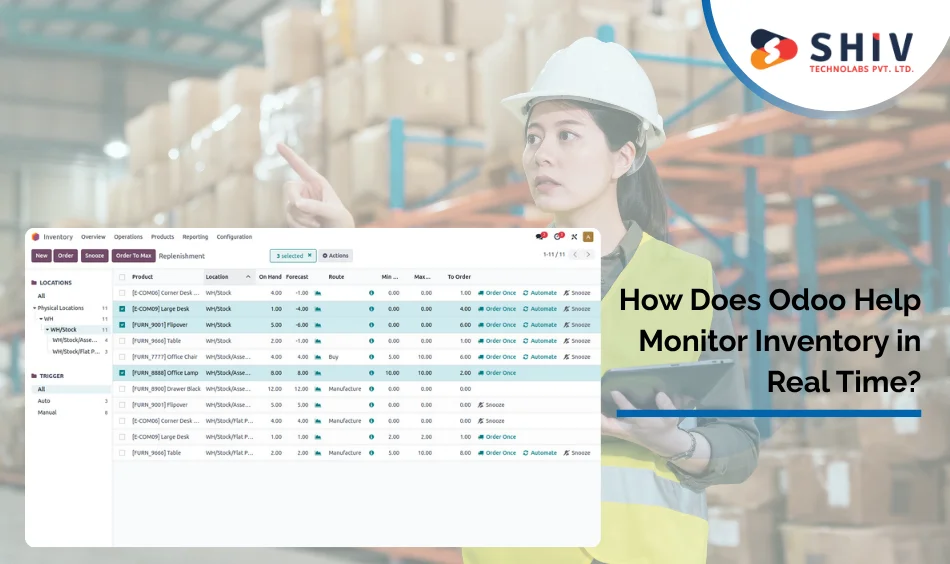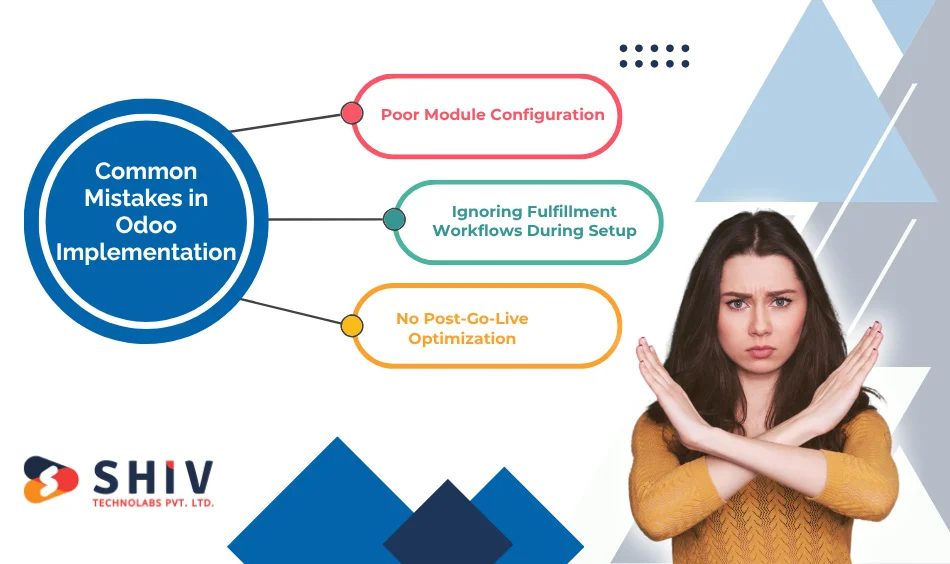Table of Contents
Every delayed order, inventory mix-up, or delivery problem causes more than stress—it leads to real business losses. Around 43% of retailers cite managing inventory as their biggest challenge, which affects both profits and customer loyalty. Several companies attempt to resolve this with the help of spreadsheets or a set of tools, but this only delays the problem.
Without the coordination of your sales, inventory, shipping and purchasing systems, chances are that you will be on a path of confusion. It is where Odoo implementation services can be helpful. A well-configured Odoo setup does more than just track inventory or manage deliveries—it connects every part of your supply chain and displays it in real time.
In this guide, we’ll explain how Odoo resolves stock and delivery issues effectively.
Why Stock and Delivery Problems Cost More Than You Think?
Inventory problems hurt your bottom line more than you might realize. Dealing with stock shortages and late deliveries isn’t just about fixing issues—it’s also about saving money.
Missed Sales, Poor Customer Reviews, and Increased Refunds
When your product is out of stock or takes a long time to be delivered, you will get no customers waiting. They abandon their orders, post negative reviews, and go to your competitor companies. This doesn’t just cost one sale—it costs long-term trust. Even loyal customers may switch to your competitors after a single negative experience.
Hidden Costs: Overstocking, Emergency Shipments, and Human Errors
To avoid running out of items, many businesses overstock, which ties up money in items that sit unused. When something goes wrong, they pay extra for rush deliveries. Additionally, when teams use different systems or manually enter data, it increases the likelihood of mistakes, which in turn leads to further delays.
These stock and delivery problems slowly reduce your profits without you even noticing. This is why Delivery tracking Odoo is helpful.
How Does Odoo Help Monitor Inventory in Real Time?

To manage inventory well, you need live updates. Odoo makes this easy by giving real-time stock information that your team can trust.
Real-Time Stock Updates Across Multiple Warehouses
Even if your stock is spread across different places, Odoo keeps everything in sync. You’ll know exactly how much of each item is in each warehouse. As soon as you sell or receive something, it updates automatically.
Automated Low-Stock Alerts
Odoo acts as a warning when the inventory is low. You can create reorder rules for each item or warehouse, so your team always knows what to buy and when.
Barcode and Lot Tracking Features
Inventory management with Odoo allows scanning items into the system with barcodes. This increases the speed of stock transfer and reduces errors. Lot and serial tracking will also allow you to track items, which is convenient in such sensitive sectors as medicine, food, or electronics.
By tracking inventory accurately, you can be smart when ordering, minimize wastage, and deliver on the scheduled date.
Delivery Delays? Use Odoo to Track Orders Smarter
Customers also blame you when you have late shipping, even when it was not your fault. Odoo helps you manage deliveries more effectively by providing tools that enable you to track delivery steps.
Order Status, Shipment Progress, and Expected Delivery Dates
Odoo displays the recent updates of all the orders. You will know what has been packed, what has been shipped and when the customer can expect it. This puts your team and customers on track.
Integration with Shipping Carriers
Odoo can be used with FedEx, DHL, and UPS shipping services. You can print labels, assign tracking numbers, and create shipping rules, all in one location.
Triggers and Automated Notifications
You can create automatic messages that tell customers when their order is processed, shipped, or delayed. This removes the need for your staff to send updates manually.
Shipping with Odoo means a more convenient experience for your customers.
Connecting Procurement, Warehousing, and Delivery in One Flow
Things go wrong when your systems don’t work together. Stock control Odoo helps in integrating purchase and delivery into a single system.
How Odoo Connects Purchase Orders to Stock Availability
When an item is running low, Odoo can automatically create purchase orders according to your predefined rules. It also tells you which location needs the product, so you order exactly what’s needed.
Auto-Replenishment and Supplier Management
Odoo helps manage your vendors, delivery times, and price history. With auto-reorder rules, the right products get ordered on time from the right supplier, without guessing.
Smooth Handoff Between Teams
Procurement orders the material, the warehouse receives it, and fulfillment ships it. All these steps are kept inter-linked in Odoo, which means that teams do not require communicating with each other through calls and emails all the time.
Such a linked-up system will minimize errors, accelerate the process and keep everybody on the same page.
Common Mistakes in Odoo Implementation (And How to Avoid Them)

Odoo is an effective tool; however, it must be set up properly to work effectively. Many problems happen not because of Odoo itself, but due to bad planning during setup.
Poor Module Configuration
Some businesses install too many or too few Odoo modules. Without matching the apps to your business needs, the system becomes either too complicated or too limited. A professional Odoo setup matches the modules with how your business actually works.
Ignoring Fulfillment Workflows During Setup
You can’t just install the inventory app and hope for the best. Skipping setup for returns, packaging, and order routing creates major issues later. Fulfillment must be planned from the beginning.
No Post-Go-Live Optimization
Many people think the work is done after the system goes live. That’s not true. If you don’t review performance or give your team regular training, the system quickly becomes outdated. You must keep updating based on how people actually use it.
Planning well and avoiding these mistakes saves time and money later.
Real-World Example: Stock Fix in a Multi-Warehouse Setup Using Odoo
Let’s see how warehouse automation Odoo, solves inventory problems for a growing business.
The Problem: Inventory Chaos Across Locations
An electronics company had three warehouses, but no way to track stock across them in real time. Deliveries were often late because teams didn’t know what was available where. They used spreadsheets and made lots of calls to check stock manually.
The Implementation: Multi-Warehouse Inventory with Automation
Odoo was set up to track stock at all locations. Automated updates, barcode scanning, and stock rules were added. Orders were matched with real-time demand for each warehouse.
The Result: Faster Fulfillment and Happier Customers
Order accuracy improved by 95%. Stock shortages were cut in half. Warehouse teams no longer needed to communicate manually. Customers got faster delivery and more accurate shipping information.
This example demonstrates how Odoo, when utilized effectively, can significantly transform operations.
When to Upgrade Your Setup for Advanced Fulfillment
A simple system might work at the start, but fast-growing businesses often need more. Here are signs that it’s time to expand your Odoo features.
Handling Bulk Orders, Returns, or International Shipping
You will require additional features in case your business has large B2B orders, receives excessive returns, or delivers internationally. Odoo supports batch picking, return handling, and multi-currency shipping rules for complex setups.
Using Additional Apps/Modules (DPD, DHL, Warehouse Automation)
Odoo supports the delivery services such as DPD and DHL. It also enables tools such as barcode scanners, IoT devices, and robotics to create a smart warehouse. Such aspects enable you to experience uniform growth and remain competitive.
Conclusion
Need Pro Help? Shiv Technolabs, a leading odoo development partner, has got your back.
Odoo delivers excellent results—but only if it’s done right. At Shiv Technolabs, we’ve helped companies move from tools like WooCommerce, Magento, or their own custom systems to Odoo—without losing data or wasting time.
We handle everything for you:
- Setting up Odoo to match your business needs
- Connecting it to your shipping and inventory tools
- Teaching your team how to use it and helping even after launch
If you’re still using tools that don’t grow with your business—or managing orders from a spreadsheet—it’s time for something better.
Get ready for the future with Odoo, installed the smart way.























